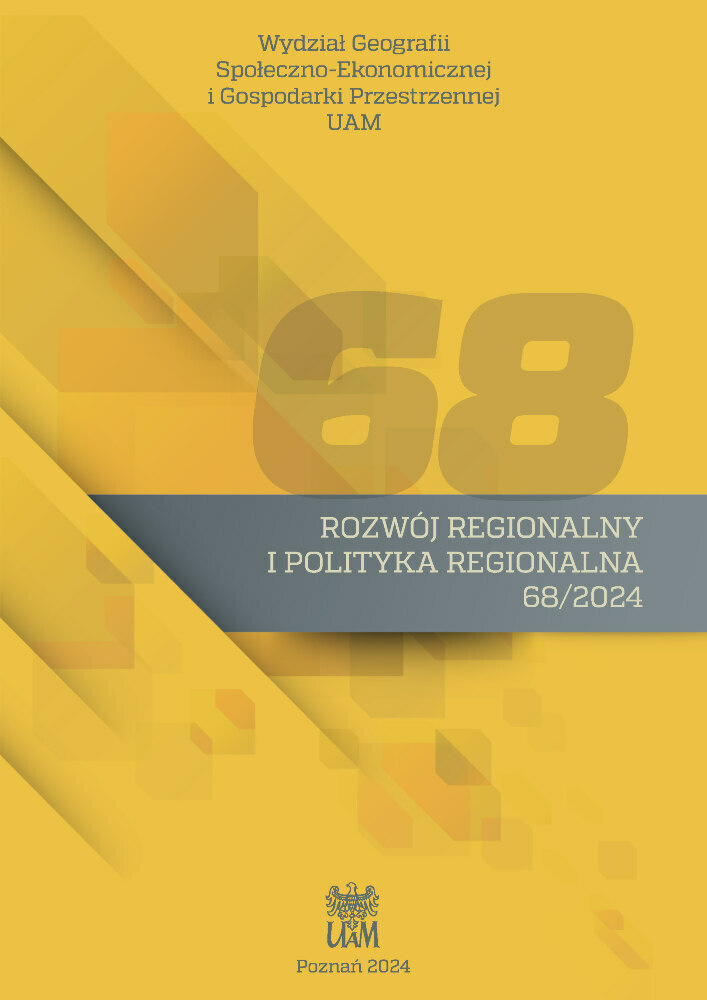Abstract
Celem artykułu jest porównanie ścieżek rozwoju wybranych miast przemysłowych Gruzji, ze szczególnym uwzględnieniem przemian, które nastąpiły w nich po odzyskaniu przez kraj niepodległości. Zakres przestrzenny badania obejmuje cztery gruzińskie monotowns: Cziaturę, Kaspi, Tkibuli oraz Rustawi. Zakres czasowy analizy szczegółowej, opartej na danych ludnościowych, obejmuje lata 1922–2021 (podczas badania ścieżek rozwoju Cziatury oraz Tkibuli odniesiono się również do okresu sprzed włączenia Gruzji do Związku Radzieckiego). W artykule przedstawiono możliwe ścieżki rozwoju gruzińskich monotowns, które wyodrębniono w oparciu o założenia teorii zależności od ścieżki.
Funding
The study is the result of research project No. 2018/31/N/HS4/00178 funded by the National Science Centre.
References
Archive Today (https://archive.ph/20120523230604/http://rustavi.ge/; accessed: 5 January 2022).
AUTOPAPA, Caucasus main auto market page (https://ap.ge/en/page/about?currency=usd; accessed: 10 January 2022).
Awdaliani E. 2013. ჭიათურის მანგანუმი – ქართული „შავი ოქროს“ ისტორია. Forbes (https://forbes.ge/tchiathuris-manganumi-qarth/; accessed: 5 January 2022).
Averkieva K., Efremova V. 2022. Urban shrinkage in Russia: Concepts and causes of urban population loss in the post-Soviet period. [In:] W. Chung-Tong, M. Gunko, T. Stryjakiewicz, K. Zhou (eds.), Postsocialist Shrinking Cities. Routledge, London, p. 147-159. DOI: https://doi.org/10.4324/9780367815011-13
Barbakadze I. 2008. Explaining Inflation in Georgia: Do Exchange Rate and Nominal Wage Matter? (http://www.nbg.gov.ge/uploads/workingpaper/ nbgwp04.08.pdf; accessed: 10 January 2022).
Ciesiółka P., Gunko M., Pivovar G. 2020. Who defines urban regeneration? Comparative analyses of medium-sized cities in Poland and Russia. Geographia Polonica, 93(2): 245-259. DOI: https://doi.org/10.7163/GPol.0172
Council of Europe. 2016. Chiatura Reference Plan 2016 (https://rm.coe.int/chiatura-georgia-comus-reference-plan-english-version/168074818d; accessed: 5 January 2022).
Crowley S. 2015. Monotowns, Economic Crisis, and the Politics of Industrial Restructuring in Russia. Russian Analytical Digest,164: 7-10.
Dawitaj F.F. (ed.) 1972. Związek Radziecki – Gruzja. Państwowe Wydawnictwo Naukowe, Warszawa.
Dzionek-Kozłowska J. 2009. Transformacja ustrojowa z perspektywy koncepcji path dependence. Prace Naukowe Uniwersytetu Ekonomicznego we Wrocławiu. Ekonomia, 3(74): 213-227.
Dzionek-Kozłowska J. 2015. Zróżnicowanie ścieżek transformacji krajów Europy Środkowo-Wschodniej z perspektywy współczesnych teorii ekonomicznych. Optimum. Studia Ekonomiczne, 1(73): 14-26. DOI: https://doi.org/10.15290/ose.2015.01.73.02
French R.A., Hamilton F.E.I. 1979. Is there a Socialist City? [In:] R.A French, F.E.I. Hamilton (eds.), The Socialist City: Spatial Structure and Urban Policy. John Wiley & Sons, Chichester, New York, Brisbane, Toronto, p. 1-23.
Global Administrative Areas 2024. GADM database of Global Administrative Areas. © 2018-2022 GADM. Version 4.1 (www.gadm.org; accessed: 17 March 2024).
GEOSTAT, National Statistics Office of Georgia, Tbilisi (https://www.geostat.ge/en; accessed: 15 December 2021).
GoogleMaps database (https://www.google.com/maps; accessed: 13 January 2022).
Gwosdz K. 2004. Koncepcja zależności od ścieżki (path dependence) w geografii społeczno-ekonomicznej. Przegląd Geograficzny, 76(4): 433-456.
Harris C.D. 1945. The Cities of the Soviet Union. Geographical Review, 35(1): 107-121. DOI: https://doi.org/10.2307/210935
Ilchenko M. 2018. “Socialist cities” under post-Soviet conditions: symbolic changes and new ways of representation. Europa Regional, 25(2): 30-44 (https://nbn-resolving.org/urn:nbn:de:0168-ssoar-59091-8).
Jaroszewska E., Wieczorek M. 2015. Przemiany starych miast przemysłowych w kontekście koncepcji zależności od ścieżki (path dependence). Przykład Saint-Étienne i Wałbrzycha. Rozwój Regionalny i Polityka Regionalna, 32: 107-122.
Kaczmarek-Khubnaia J. 2020. Agriculture in Georgia − the condition of the sector and its importance in the process of socio-economic development of the country and its regions. Journal of Geography, Politics and Society, 10(2): 35-44. DOI: https://doi.org/10.26881/jpgs.2020.2.05
Kaczmarek-Khubnaia J. 2023. Gruzja i jej regiony na poradzieckiej ścieżce rozwoju społeczno-gospodarczego: uwarunkowania, poziom oraz dynamika procesu. Studia i Prace z Geografii, 97. Bogucki Wydawnictwo Naukowe, Poznań.
Kokaia L. 2019, December 13. Stuck between a rock and a hard place – the miners of Tkibuli. OC-Media (https://oc-media.org/features/stujk-between-a-rojk-and-a-hard-plaje-the-miners-of-tkibuli/; accessed: 10 January 2022).
Mahoney J. 2000. Path Dependence in Historical Sociology. Theory and Society, 29(4): 507-548. DOI: https://doi.org/10.1023/A:1007113830879
Mdzinarishvili D. 2018. December 5. Georgian mining town offers little alternative to grim and deadly job. Reuters (https://www.reuters.com/article/cnews-us-georgia-tkibuli-mining-idCAKBN1O427L-OCATP; accessed: 5 January 2021).
Murray M.J. 2022. Many Urbanisms: Divergent Trajectories of Global City Building. Columbia University Press, New York Chichester, West Sussex. DOI: https://doi.org/10.7312/murr20406
OpenStreetMap contributors. OpenStreetMap database OpenStreetMap Foundation: Cambridge, UK. © OpenStreetMap contributors. Available under the Open Database Licence from: openstreetmap.org. Data mining by OSM Standard plug (accessed: 17 March 2024).
Organization of World Heritage Cities (https://www.ovpm.org/city/chiatura-georgia/; accessed: 20 December 2021).
Pinchuk O. 2019, June 6. Rustavi, Georgia: history of a mono-town. Open Democracy (https://www.opendemocracy.net/en/odr/rustavi-georgia-monotown-history; accessed: 15 December 2021).
Pirveli M. 2002. Miasto gruzińskie w świetle europejskiej i orientalnej koncepcji urbanistycznej. Wydawnictwo Akademickie Dialog, Warszawa.
Population statistics of Eastern Europe & former USSR (http://pop-stat.mashke.org/; accessed: 20 December 2021).
Reiner T.A., Wilson R.H. 1979. Planning and Decision-Making in the Soviet City: Rent, Land, and Urban Form. [In:] R.A French, F.E.I. Hamilton (eds.), The Socialist City: Spatial Structure and Urban Policy. John Wiley & Sons, Chichester, New York, Brisbane, Toronto, p. 49-73.
Sakulvadze J. 2018. Urbanization Trends and Development of Cities in Georgia. [In:] D. Gogishvili, A. Coppola (eds.), Cities of the South Caucasus: a view from Georgia. Quodlibet, Università degli Studi Roma Tre, Rome, p. 19-31. DOI: https://doi.org/10.2307/j.ctvdf0kf6.4
Shastitko A., Fatikhova A. 2015. Monotowns: a new take on the old problem. Baltic Region, 1: 4-24. DOI: https://doi.org/10.5922/2079-8555-2015-1-1
Smith D.M. 1996. The Socialist City. [In:] G. Andrusz, M. Harloe, I. Szelenyi (eds.), Cities After Socialism: Urban and Regional Change and Conflict in Post-Socialist Societies. Wiley- Blackwell Publishers, Oxford, Cambridge, p. 70-99. DOI: https://doi.org/10.1002/9780470712733.ch3
Stryjakiewicz T. 2014. Współczesny kontekst i podstawy teoretyczno-metodologiczne procesu kurczenia się miast. [In:] T. Stryjakiewicz (ed.), Kurczenie się miast w Europie Środkowo-Wschodniej. Bogucki Wydawnictwo Naukowe, Poznań, p. 9-14.
Sroka B.T. 2022. Urban Shrinkage as a Catalyst of a Transition, Revolving around Definitions. Sustainability, MDPI, 14(20): 1-12. DOI: https://doi.org/10.3390/su142013203
Wellisz S. 1996. Georgia – A Brief Survey of Macroeconomic Problems and Policies. CASE Network Studies and Analyses, 8. DOI: https://doi.org/10.2139/ssrn.1475263
License
Copyright (c) 2024 Julia Kaczmarek-Khubnaia

This work is licensed under a Creative Commons Attribution 4.0 International License.

